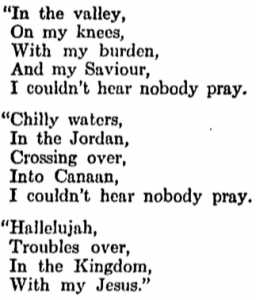The men and women who stepped in chains from the slave ships were musical people who were used to expressing intense emotions, beliefs, and ideas into song. Sold into hard work, poverty and oppression in America, they turned to songs for solace, singing of hardship and with passion, a tradition that had been long familiar to their race.
Their songs summarized their beliefs of salvation, expressing in broken words the genuine spiritual realities of a world unseen, the world of Christian virtues: forgiveness, hope, faith, love, endurance, eternal life, holiness. Although, how deeply the religious spirit permeated these songs is not always forthcoming. The same is to be said about a feeling of triumph heard through the songs.
The lyrics from the song “I couldn’t hear nobody pray” are a good example of the text turning from mourning trials to an ultimate triumph.
Hear “I couldn’t hear nobody pray”: http://www.loc.gov/jukebox/recordings/detail/id/1798/
In spite of trials, the underlying moral and strength can be seen. King speaks of the emotion that the text in spirituals conveys saying that “however mournful and depressing the opening lines are, there is almost always a note of triumph before the song is done.”
Spirituals became a solvent for a race’s healing from bitterness and pain, but also fed them with joy and determination.
Figure 1, 2: King, W. J. (1931, 05). The negro spirituals and the hebrew psalms. The Methodist Review (1885-1931), 47, 318. Retrieved from http://search.proquest.com/docview/136470904?accountid=351

